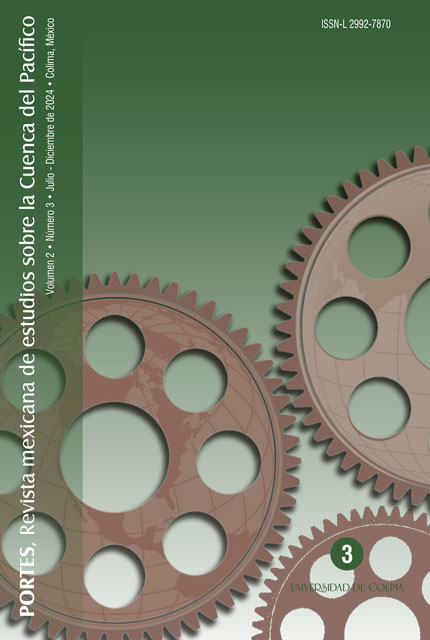The Mexico-Japan Strategic Partnership Agreement.
Dynamics, challenges and perspectives.
DOI:
https://doi.org/10.53897/RevPortes.2024.03.04Keywords:
Mexico, Japan, Strategic Partnerships, foreign investments and tradeAbstract
In 2005, Mexico and Japan signed an Economic Partnership Agreement. The treaty is aimed to improve the economic relations between both nations and take advantage of market opportunities and bilateral cooperation. As a consequense, economic activities have grown more particularly in trade and investments from Japan. Analyzing the performance between both countries, Japan is more favored because of the comparative and absolute advantages of its producers.It is the same case for investments in Mexico. On the contrary, Mexico has also been benefited by promoting exports in the Japanese market, as a provider only in some sectors. According to the nature of the treaty, the of economic complementarity is met when producers participate in both economies and fulfill the requirements for production and commercialization. As the time goes by, the unequal relation remains in favor of the Eastern country. Through an analysis of results here is examined the commercial and economic perfomance between both nations and it is shown how the situation impacts in the expectations for the future.
Downloads
Metrics
References
Csurgai, Gyula (March, 1998). Geopolitics, geoeconomics and economic intelligence. The Canadian Institute of Strategic Studies https://geopolitics-geneva.ch/wp-content/uploads/2018/11/Geopolitics_Geoconomics_CISS-1.pdf
Data Mexico. (2023). Japón. Gobierno de México. https://www.economia.gob.mx/datamexico/es/profile/country/japon
Dávila, Consuelo (2008). La Política Exterior de México y sus nuevos desafíos. UNAM. Plaza y Valdés. 1ª. Edición.
Díaz Leal, Julia (Coordinator) (2006). China y Japón. Modernización económica, cambio político y posicionamiento mundial. Mexico. ITAM
Economia, SNCI (2004). Mexico´s Network of Free Trade Agreements and Multilateral Negotiations. Reviewed on May 9th 2024. http://www.economia-snci.gob.mx/sic_php/pages/bruselas/pdfs/FS02FTAS.pdf
Falck Reyes, Melba E. 2022. «Las Relaciones económicas Entre México Y Japón a 120 años Del Primer Acuerdo». Revista Mexicana De Política Exterior, n.º 86 (marzo):19-65. https://revistadigital.sre.gob.mx/index.php/rmpe/article/view/628.
Fondo Monetario Internacional (2001). La liberalización del comercio internacional y los países en desarrollo. Estudios temáticos. https://www.imf.org/external/np/exr/ib/2001/esl/110801s.htm
Gray, H.P. (1985). The Argument for Free Trade and its Underlying Assumptions. In: Free Trade or Protection? Palgrave Macmillan, London. DOI: https://doi.org/10.1007/978-1-349-06983-5
JETRO, Trade and Investment in Mexico, https://www.jetro.go.jp/world/cs_america/mx/gtir.html, Accessed 27 November 2023.
JICA (2003). Overview of the JICA annual report. Central America and the Caribbean. Increasing mutual cooperation in the region. https://www.jica.go.jp/Resource/english/publications/reports/annual/2003/pdf/200310.pdf
Krist, William (2014). Trade agreements and economic theory. The Wilson Center. https://www.wilsoncenter.org/chapter-3-trade-agreements-and-economic-theory
Macrotrends (2024). Japan GDP growth rate 1960-2024. https://www.macrotrends.net/global-metrics/countries/JPN/japan/gdp-growth-rate
Ministry of Finance – Japan. Trade Statistics of Japan, https://www.customs.go.jp/toukei/info/index.htm, Accessed 27 November 2023.
Oatley, Thomas (2011). International Political Economy. United Kingdom. Routledge. 5th Edition
OMC. (2012). Adhesiones a la Organización Mundial del Comercio. https://www.wto.org/spanish/res_s/booksp_s/historywto_04_s.pdf
Park, Kayoung, Japan's FTA Strategy and its Implications (December 28, 2015). Korea Institute for Industrial Economics and Trade Research Paper No. 15/IER/20/6-5, KIET Industrial Economic Review, Vol. 20 No. 6, pp. 45-54.
Prebisch, Raul. (1979) Neoclassical theories of economic liberalism. CEPAL Review. Santiago, Chile. April, 1979. DOI: https://doi.org/10.18356/795952d8-en
Secretaría de Economía. Estadísticas del Comercio Exterior. Exportaciones por destino. https://www.economia.gob.mx/files/gobmx/comercioexterior/estadisticas/Anual-Exporta-2021.pdf
Secretaría de Economía. Estadísticas del Comercio Exterior. Importaciones por origen. https://www.economia.gob.mx/files/gobmx/comercioexterior/estadisticas/Anual-Importa-2021.pdf
SICE (2024). Mexico-Japan. Foreign Trade Information System. Organization of American States. http://www.sice.oas.org/tpd/mex_jpn/mex_jpn_e.asp
Solís, Mireya (Abril, 2000). México y Japón: Las oportunidades del libre comercio. Estudio elaborado para la Subsecretaría de Negociaciones Económicas Internacionales. México. El Colegio de México. Reviewed in http://www.sice.oas.org/tpd/mex_jpn/studies/oportunidades_s.pdf
Szekely, Gabriel (1994). Anuario Asia Pacífico. Las inversiones japonesas en México. México, El Colegio de México. Pp 85-102. DOI: https://doi.org/10.24201/aap.1994.230
SICE-OAS (2004). Acuerdo de Asociación Económica México-Japón. http://www.sice.oas.org/tpd/mex_jpn/studies/puntos_s.pdf
Traslosheros, Gerardo. La negociación del Acuerdo para el Fortalecimiento de la Asociación Económica entre México y Japón. México y la Cuenca del Pacífico. Vol. 10, núm. 28. Enero-abril de 2021. Reviewed at https://www.scielo.org.mx/pdf/mcp/v10n28/2007-5308-mcp-10-28-9.pdf DOI: https://doi.org/10.32870/mycp.v10i28.728
Villarreal, María de los Angeles (April 25, 2017). México´s Free Trade Agreements. Congressional Research Service. United States.
World Bank. World Development Indicators, The World Bank Group, https://databank.worldbank.org/source/world-development-indicators# . Accessed 27 November 2023.
Yoshino, Naouyuki and Taghizadeh-Hesari, Farhad (2015). Japan´s lost decade: Lessons for other economies. ADBI Working Paper Series. Number 521. https://www.adb.org/sites/default/files/publication/159841/adbi-wp521.pdf DOI: https://doi.org/10.2139/ssrn.2593714
Downloads
Published
How to Cite
Issue
Section
License
Copyright (c) 2024 Juan Roberto Reyes Solís, Mana Iwama Hirao

This work is licensed under a Creative Commons Attribution-NonCommercial-ShareAlike 4.0 International License.
La revista PORTES de la Universidad de Colima se distribuye bajo una Licencia Creative Commons Atribución-NoComercial-CompartirIgual 4.0 Internacional





